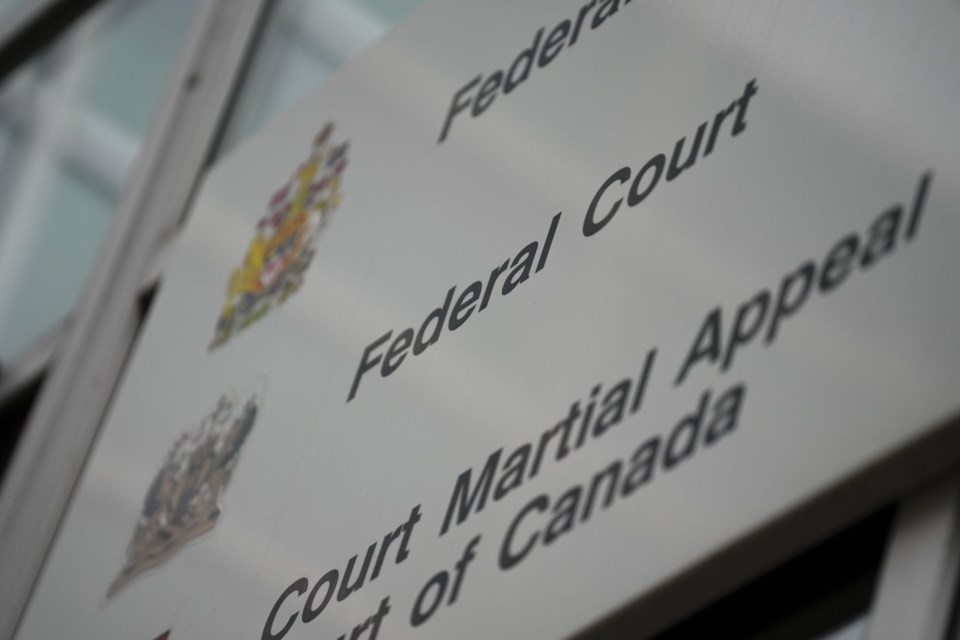MONTREAL — An Indigenous man convicted of murder and attempted murder could get parole after the Federal Court ruled the parole board failed to consider his traumatic past when it denied his release.
Jeffrey George Ewert, 61, was convicted in 1984 after he sexually assaulted and strangled two women in British Columbia in two separate incidents while highly intoxicated, killing one and leaving the other severely disabled.
The Parole Board of Canada denied his application for day parole in 2022, concluding he still posed an undue risk to society. But a Federal Court judge in Montreal last week overturned that decision, ruling the board failed to consider what are known as Gladue factors — Ewert's traumatic childhood and the Indigenous healing process he has undertaken.
Ewert's lawyer, Nora Demnati, says the parole board has been slow to embrace Gladue principles, which require the criminal justice system to consider the unique circumstances of Indigenous people when decisions are made about bail, sentencing and parole. She hopes this latest decision will force the board to "give proper consideration" to Indigenous offenders' background and efforts at rehabilitation.
The case will now return to the parole board's appeal division for a new assessment. Demnati said she's "very hopeful" Ewert, who has been behind bars for 40 years, will be granted day parole. "He should definitely get parole," she said. "He should have gotten parole years ago, to be honest."
Ewert was in his early twenties when he committed his crimes, and is serving two concurrent life sentences. He became eligible for day parole in 1996, but didn't apply until 2022. In a previous court case, he said he believed he was unlikely to be paroled because he was deemed too high-risk.
Ewert, whose mother was of M√©tis descent and whose father was British, was adopted as a baby by a non-Indigenous family in Surrey, –°¿∂ ”∆µ His adoptive father was alcoholic and his adoptive mother had psychiatric problems. She abused him physically, psychologically and sexually from the ages of about six to 12, according to the court decision. He began abusing substances in his early adolescence.
Since his sentencing, Ewert has engaged in a healing process and practised traditional Indigenous teachings that have helped him deal with his anger, triggers and substance abuse, wrote Justice Jocelyne Gagné. He has had a minimum-security classification since 2019 and has had several escorted temporary absences. He is currently being held at the minimum-security Federal Training Centre in Laval, Que. He asked for day parole at the Salvation Army halfway house in Saskatoon.
Correctional Service Canada (CSC) deems Ewert's risk of violence as "moderate to high in the short term," according to the decision. His correctional file, reviewed by the parole board, finds that he "exhibits the need to dominate and control women, emotional management issues, an explosive temperament, and distrust towards others."
The parole board denied Ewert's release in December 2022, but Gagné found the board didn't give enough weight to Ewert's history or the treatment he's received. "The evidence demonstrates that (Ewert) has gained extensive awareness about how his background and childhood trauma led to his heavy substance abuse, anger triggers, and his relationships with women," she wrote.
Demnati said the parole board does pay attention to Indigenous offenders' background and trauma, but only superficially. "The risk for the public is so paramount to their analysis that it sometimes tends to trump other considerations," she said. She believes that steps Indigenous offenders have taken to heal from their trauma, like embracing their identity and culture, are often disregarded.
"No one gets released on parole being perfect or having a zero risk of reoffending," she said. "It's always a question of is the risk manageable for society, given the release plan that we are offering to the parole board and given the work that has been done?"
A 2016 Federal Court decision found that Gladue principles do apply to parole decisions. But Jonathan Rudin, special projects director at Toronto-based Aboriginal Legal Services, said the parole board still has a hard time assessing Indigenous offenders.
For one thing, he said, most of the board's information comes from the CSC, which he said tends to classify Indigenous offenders as higher-risk. Another issue is that Gladue reports, which are used in pre-sentencing and bail hearings to lay out the unique circumstances of Indigenous offenders, rarely exist for parole hearings.
Ewert has a long history of litigation, and was referred to in a previous decision as "a bit of a jailhouse lawyer." In 2018, a case involving Ewert ended up at the Supreme Court of Canada, which found that the CSC failed to ensure that its risk assessment tests are accurate for Indigenous offenders.
Rubin said both that decision and the latest one are significant. "I think every time the ... court makes it clear that you have to do more than say, 'I've considered Gladue,' I think that's important."
This report by The Canadian Press was first published Aug. 1, 2024.
Maura Forrest, The Canadian Press




